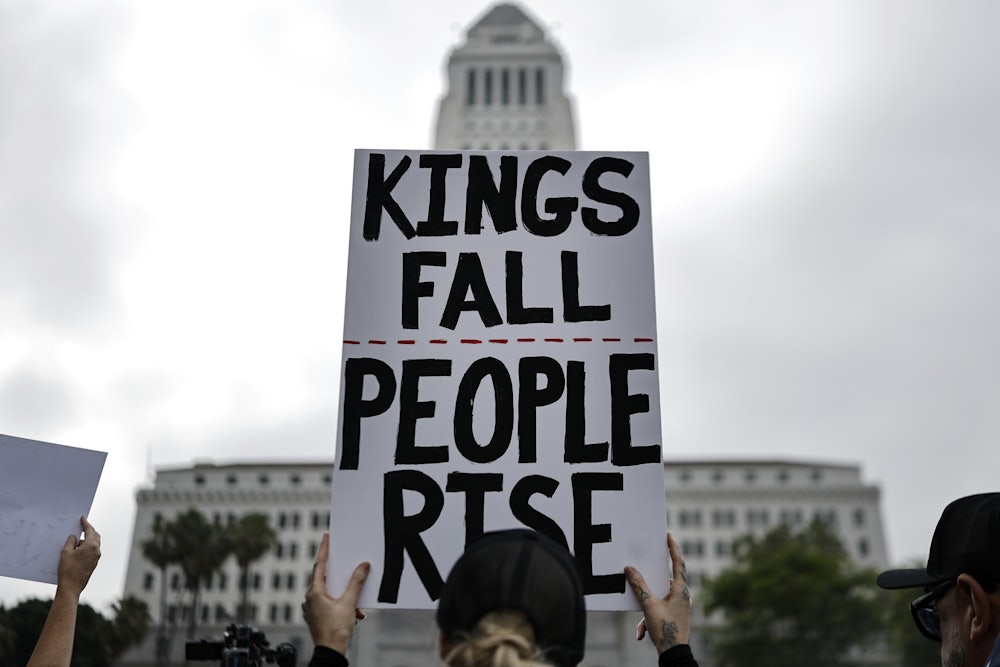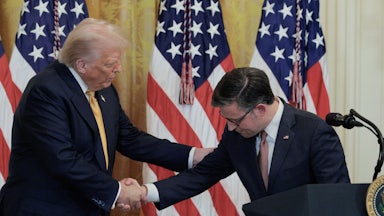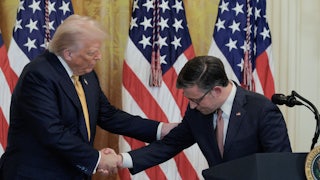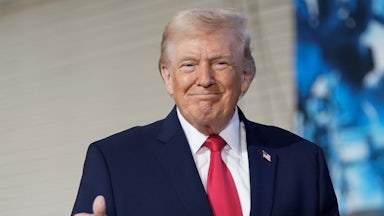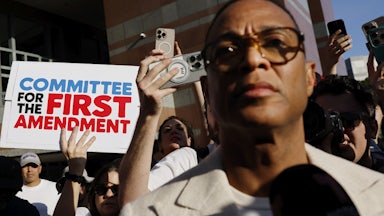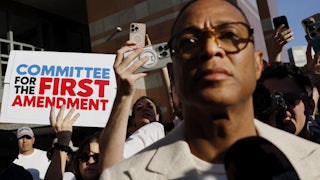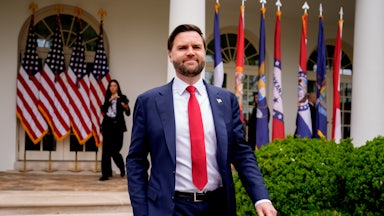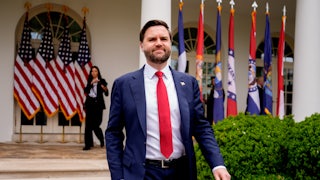The federal government is currently shut down because Congress and President Donald Trump couldn’t agree on a funding measure. Earlier this week, the Trump administration claimed that it would keep funding WIC, a federal nutrition program for low-income families, despite the lapse in congressional appropriations. How do they plan to do that? By using revenue from Trump’s tariffs to make up the shortfall.
Is that legal? Probably not. For one thing, the tariffs themselves are likely illegal because the president invoked a law to levy them that doesn’t actually mention tariffs at all. (The Supreme Court will hear a case on the matter in November.) Using illegally obtained revenue to fund unrelated programs without Congress’s permission is likely a violation of the separation of powers as well, even if the programs are otherwise unimpeachable.
Few legal experts have applauded Trump’s attacks on Congress’s power of the purse. But he would likely find a kindred spirit in Charles I, the seventeenth-century English king whose own taxation policies and preference for absolute rule led to civil war. Charles’s downfall during the English Civil War helped transition England from the divine right of kings to parliamentary supremacy. It also inspired the Founders as they built a republican government around rights and liberties on these shores.
Trump’s second term reads like a list of the Founders’ worst fears. Over the last 10 months, he has blocked congressional appropriations at will and levied billions of dollars in tariffs on Americans without the consent of Congress. He has deployed troops onto the streets of the nation’s capital for pretextual reasons and sent the National Guard into states without the consent of their governors. He has claimed absolute immunity from criminal prosecution while targeting his political opponents with malicious indictments. “We took freedom of speech away,” he even remarked in a recent White House event.
All of this is at odds with two and a half centuries of American political thought. But it also extends even further back through the Anglo-American legal tradition to lessons that the Founders learned long before the Revolution. The Trump administration has done many things over the past 10 months on the specious grounds that doing so was necessary to protect our “culture” or our “way of life.” Its actions show that it knows nothing about them.
English kings and parliaments often quarreled over money. The medieval English monarchy was responsible not only for the king’s personal expenses but also for the salaries of royal officials, the maintenance of warships and docks, the upkeep of castles, palaces, and other holdings, and so on. In times of war, the king would also be responsible for paying armies in his service. War in the medieval era, as well as today, could be ruinously expensive.
The Crown had held its own land and estates since the Norman Conquest, but this was almost always insufficient to cover its costs on its own. By the time Charles took the throne in 1625, his predecessors had worked out a solution of sorts. Parliament would grant newly crowned monarchs permission to collect “tonnage and poundage,” a form of import-export duties, for the duration of their reign. In times of war, the Crown could also ask for additional funds as necessary.
It is important to emphasize that Parliament did not function as a full-time legislature as we know it today. English monarchs could summon and disband parliaments at will. (They technically retain this power today but now only exercise it at the prime minister’s request.) Elizabeth I only summoned it a dozen times during her reign, often with great hesitation and annoyance. Her successor, James I, whose only experience was with Scotland’s more deferential counterpart, quarreled with Parliament more openly than Elizabeth, though not as bitterly as his son.
Charles took the throne in 1625 amid religious and political tension. Henry VIII had cleaved England from Rome almost a century earlier, but the exact contours of what the English church would look like remained an open question. Charles, though Protestant himself, often sided with those who favored a church that more closely resembled the Catholic one it had left. His marriage to Henrietta Maria, a French Catholic, stirred distrust among Protestants who feared a return to papal authority.
Further complicating matters was that Charles was also an avowed proponent of the divine right of kings, in which a monarch’s right to reign came from God and no one else. This was not unusual in and of itself: His father, James, had written treatises defending the same principle during his own reign, and the Tudors before them—most notably Henry VIII—had adopted the same stance. Nor was this concept alien to Christendom in general. But in the English cultural mind, Catholicism and despotism were closely linked, and Charles’s perceived crypto-Catholic views amplified fears that he threatened their liberties.
What set Charles apart from his father was his absolutist stance on the matter coupled with his lack of political skill. Parliament was not merely a legislature as we know it today but an assembly of the wealthiest and most powerful subjects in the realm. Its privileges and powers had been carefully asserted and entrenched over the preceding centuries. It was one thing to insist that the king could govern without Parliament as a matter of law and philosophy. It was another to suggest that he could actually reign without the realm’s aristocrats, bishops, and landowners altogether.
When Charles became king, he asked Parliament to grant him tonnage and poundage. It declined, at least not without conditions that Charles was unwilling to meet. He responded by dismissing Parliament and beginning an 11-year era known as the Personal Rule, where he governed exclusively through his royal prerogatives and refused to summon Parliament at all.
This did not really solve the king’s problems. Without the Lords and Commons, Charles had to turn to other means to shore up his finances. He sold off lands and titles, granted illegal monopolies to supporters in exchange for cash, and taxed his Scottish subjects much more heavily, a move that would later backfire. He also leaned on other traditional forms of taxation. The most notorious of them was known as “ship money.”
Ship money was a quintessentially English tax. The island nation was naturally vulnerable to naval invasions. In times of war, medieval English kings had required coastal towns and villages to either provide warships for a royal navy or some sort of monetary equivalent when threats arose. Charles expanded these taxes in two significant ways. First, he began to require it from inland communities that had never had to pay the tax before. Second, he began to levy the tax on more vague grounds of national emergency instead of actual wartime.
Charles’s taxation efforts fueled discontent across the English countryside. Historian Jonathan Healey described it as “the most controversial of all the Crown’s financial policies, and something that would become the defining constitutional issue of the decade.” Among those unhappy with paying ship money was John Hampden, a wealthy landowner in Buckinghamshire. His refusal to pay in 1637 set up a test case of sorts on the legality of the taxes. Charles and his advisers welcomed it because they assumed the 12 royally appointed judges would rule in his favor and legitimize the taxes.
Oliver St. John, who would serve in the Cromwellian government after the Civil War, was among the lawyers who represented Hampden. A complete rejection of royal authority was still years away. Instead, he argued that Charles could only lawfully demand ship money in a genuine emergency. “St. John accepted that the king was the ‘fountain of justice,’ but claimed that ‘though all justice which is done within the realm flows from this fountain, yet it must run in certain and known channels,’” Healey noted in a recent book on the fraught and fateful era, with St. John referring to Parliament and the courts.
The king’s lawyers, as one might expect, took a more expansive view of his powers. “Bankes made the royalist case eloquently,” Healey wrote. “‘This kingdom, it is a monarchy,’ he said, ‘it consists of head and members, the king is the head.’ The head, he continued, ‘is furnished with entire power and jurisdiction.’ It was an emergency because the king said it was, and it was in the monarch’s power to anticipate danger and to act in the public interest.” It did not matter if the king’s claims were pretextual or not; all that mattered was that he made them.
Charles received the victory that he sought, but not the legitimization that he desired. Seven of the 12 judges sided with the king, with the remaining five judges dissenting. Charles grew dissatisfied that almost half of his own judges had ruled against him. The maximalist argument that his lawyers had made was constitutionally transformational as well, inflaming the opposition and delegitimizing the courts. Copies of the dissenting judges’ opinions were widely distributed among the public.
“What [the king’s lawyers] had done was convince the judges that England was, if one looked closely enough, a truly absolute monarchy,” Healey explained. “‘If we grant ship money,’ one critic would write, ‘we grant all besides.’ The king, when it came down to it, had an absolute right to take his subjects’ property as and when he felt that he needed it. To those versed in Roman history, it implied that the English people were little better than slaves, for they had no secure control of their lands and goods. More to the point, it underlined the viability of Charles’s rule without Parliament for the foreseeable future.”
Events only deteriorated even further from there. The Scots rose up in revolt once again, frustrated by overtaxation and religious differences, and Charles struggled to fund an English army to counter them. (It did not help that more than a few Englishmen sympathized with their northern neighbors.) The revolt forced Charles to end the Personal Rule and summon Parliament in 1640 to request additional funds. It would prove to be a momentous decision: The Long Parliament, as it became known by historians, would ultimately wage war against Charles in the English Civil War, overthrowing him and establishing England’s first and only republic.
Even the Stuarts’ restoration in 1660 could not fully reverse Parliament’s ascendancy. The Glorious Revolution of 1688, which saw James II’s ouster in favor of an avowedly Protestant succession, furthered England’s transition to parliamentary sovereignty. The English Civil War and its aftereffects would also be felt in the fledgling colonies in America. New England, the ideological cradle of American liberty, was drawn from the same cultural stock as the Parliamentarian forces in the war: Puritan in religiosity, egalitarian in sentiment, and democratic in local governance.
When the American colonists spoke of “the rights of Englishmen” in their protests against British rule, they referred to a liberal (and occasionally idealized) vision of the rights that they and their ancestors had enjoyed. The turmoil of the seventeenth century in England imparted to early Americans a strong cultural belief in representative government, both in laws or taxation. The English Civil War, Oliver Cromwell’s dictatorship, and the British occupation of American cities during the Revolution also instilled them with a strong cultural aversion to standing armies.
The Constitution is extremely well informed by these hard-won lessons. Article 1 explicitly gives Congress the “power of the purse,” as it was known in England, by granting it the exclusive power to levy tariffs and duties, to fund and regulate armies and navies, and to declare war. While the president is the commander in chief, military officers must be confirmed by the Senate and funding for the army must be renewed every two years.
These protections were seen as obvious and necessary for republican government by the Framers. Standing armies, as Alexander Hamilton warned in Federalist No. 10, tend to “strengthen the executive arm of government, in doing which their constitutions would acquire a progressive direction toward monarchy.” He added that it “is of the nature of war to increase the executive at the expense of the legislative authority.” Charles and Cromwell likely loomed in his mind when writing that maxim.
John Adams, the eventual second president, recounted in his diary about visiting two historical sites during a tour of England with Thomas Jefferson in 1786. “Edgehill and Worcester were curious and interesting to us, as scenes where freemen had fought for their rights,” he wrote, alluding to the Parliamentarian victories that had been achieved there in the Civil War. Adams also expressed surprise at what he saw as a lack of reverence from the locals.
“The people in the neighborhood appeared so ignorant and careless at Worcester,” he wrote, “that I was provoked, and asked, ‘And do Englishmen so soon forget the ground where liberty was fought for? Tell your neighbors and your children that this is holy ground; much holier than that on which your churches stand. All England should come in pilgrimage to this hill once a year.’ This animated them, and they seemed much pleased with it. Perhaps their awkwardness before might arise from their uncertainty of our sentiments concerning the civil wars.”
Trump knows little of this history and tradition, and the American civic tradition has left no visible imprint on him. He does not speak the common language of American political leaders, nor does he share the republican values that are so bedrock to our national identity that they went largely undisputed for the last two and a half centuries. Just as the English of the seventeenth century found themselves ruled by a Scottish-born king who did not believe in their rights and liberties, so too do Americans find themselves under a half-Scottish landlord who claimed that he has “an Article Two [of the Constitution], where I have the right to do whatever I want as president.”
A reporter asked Trump this week during a roundtable session at the White House whether he would try to suspend habeas corpus. “Suspend who?” the president replied, then referred the matter to Secretary of Homeland Security Kristi Noem. So ignorant of our Yankee culture and traditions is Trump that he was apparently under the impression that “habeas corpus” was the name of a person to be arrested or deported. Even Charles I knew better than that.
